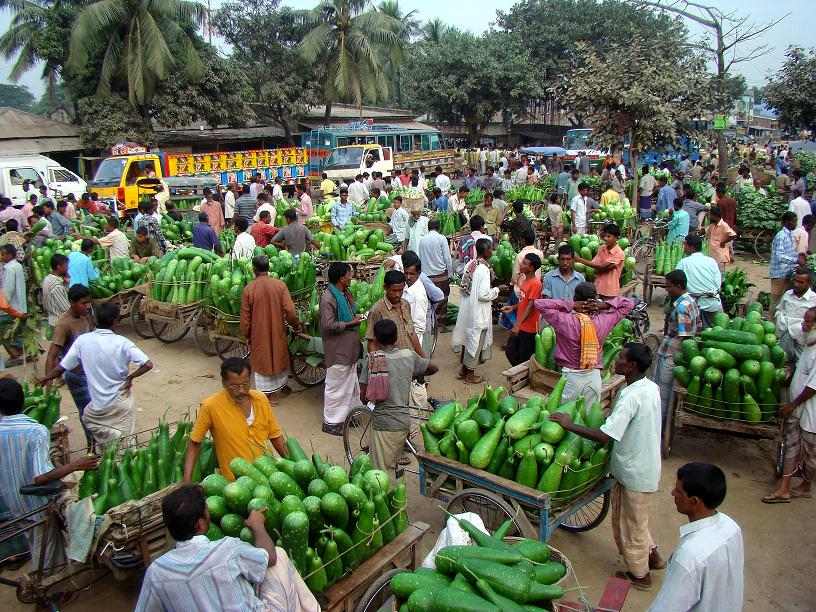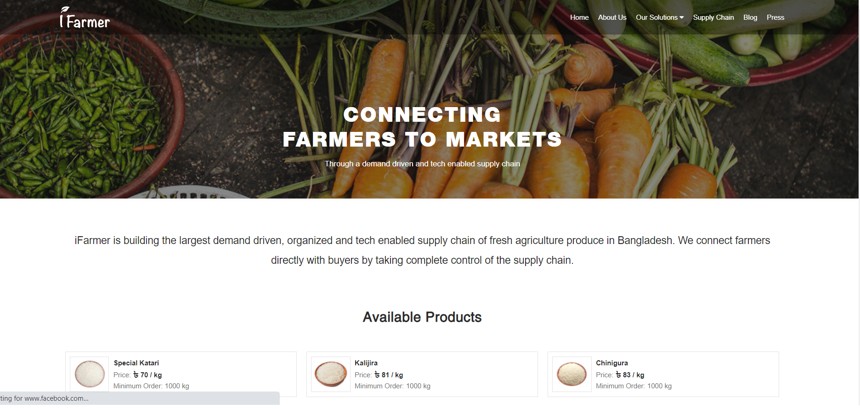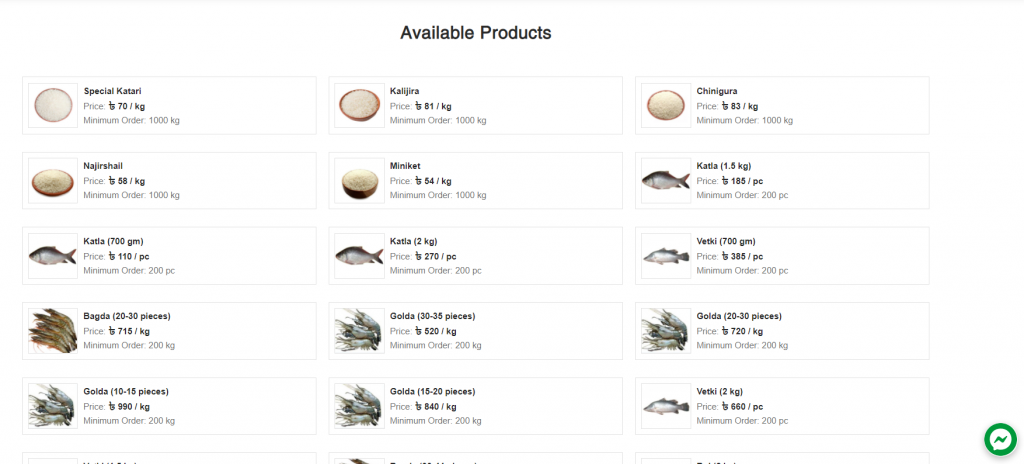
Farmers across Bangladesh rely on middlemen for selling agricultural products. For almost every agriculture product, from fish to livestock to vegetables, there are some 5-7 layers of middleman between farmers and consumers. While the middlemen-driven supply chain increases the price for consumers, farmers hardly get a fair price. An Asian Development Bank (ADB) report suggests, farmers in Bangladesh get only 27% of the selling price of red amaranth, 44% of that of pineapple, 45% of that of tomatoes, and 46% of that of cucumber. Along with access to finance and inputs, this is one of the crippling challenges farmers face.
About three years ago, iFarmer, a Dhaka-based agri-tech startup, introduced an innovative model where it works with retail investors to give farmers across Bangladesh access to much-needed finance, a common struggle for the majority of farmers since formal channels don’t give loans to farmers and informal channels generally are too expensive due to higher interest rate.
iFarmer collects the investment from retail investors, who are interested in investing in agriculture farms, which then iFarmer invests in farms in the form of input using a portfolio approach to ensure expected return for investors. It begins with input financing. In exchange, it gets a share of the profit from farmers which it then shares with the retail investors who originally invested in these farms through iFarmer and keeps a commission for itself. Farmers don’t get direct cash. Instead, iFarmer provides vouchers and other options that farmers can use to buy/access high-quality inputs through iFarmer designated retailers. iFarmer now also provides direct inputs in collaboration with input companies. To date, iFarmer has worked with over 10,000 farmers and has done almost BDT 385 million in agriculture farm financing.
Farmers don't give iFarmer anything upfront. Instead, share profit at the end of the season, which makes it easier for the farmers to repay. iFarmer’s intervention solves both the finance and input challenges for the farmers.
While iFarmer started with addressing access to finance and good quality agriculture inputs, two major challenges farmers face, access to the market remains a major problem for farmers in getting a fair price for their agriculture produce as we illustrated at the beginning.
II.
As iFarmer’s business grew, the company came to realize that farmers not getting a fair price is a business model challenge for the company. Because iFarmer makes money when farmers make money. iFarmer can ensure a healthy return for its retail farm investors only when farmers make money and repay their investment with a good return. To that end, to make the entire thing work, iFarmer has to ensure that farmers make a profit.
This is a challenge for iFarmer, which eventually prompted iFarmer to get into creating access to the market program for farmers. In June 2020, iFarmer launched an agriculture supply chain business where it works with B2B customers to supply grocery and agriculture products. It coordinates between businesses and farmers to enable the market. The company uses a tech-enabled supply chain network to aggregate fresh produce, directly from farming communities, empowering farmers to access markets directly bypassing middlemen earning a maximum profit on their products, simple payment terms, and logistics support.

“One of the reasons behind starting this project is to help farmers get access to the market and sell their products at a better rate,” iFarmer CEO Fahad Ifaz explains the motivation behind getting into the supply chain business. “Right now when a farmer sells their products to the local trader, the trader sells that to another trader, and the product is sold to several traders before finally reaching the consumers. But through us, farmers can get 10-17% more price than that.”
Over the past ten months, iFarmer has built a strong B2B agriculture produce supply business where it works with a diverse set of businesses including wholesalers, modern trade retailers, exporters, and processors to give them access to quality farm produce at a competitive price without having to deal with multiple intermediaries.
III.
The supply chain business for iFarmer rather started organically. Initially, the company did not have a setup for such a complex supply chain operation. “When we initiated the supply chain we did not have any specific structure for that”, says Mr. Fahad. “We worked on the fly. We know which farmer wants to sell which product, which made our job easy on that part. We partnered with Truck Lagbe for logistics and started supplying to our B2B clients in Dhaka. “We did not have any sorting, grading, and distribution centers for that.”
The program has evolved and grown significantly since its launch in June 2020. Initially, the company used to supply 15-20 tons of vegetables. It now supplies 400-450 tons of products to different buyers. The company has brought all its farmers under the program. Farmers who don’t work with iFarmer can also sell their products to iFarmer.
iFarmer is now setting up the necessary infrastructure and processes. The company has set up collection centers in multiple locations for collecting vegetables from farmers and plans to establish 100 collection centers by the end of 2021. The company sorts the products in collection centers and then sends the sorted goods to Savar, its central warehouse. From where it goes to clients in different parts of the country. iFarmer currently supplies to clients in Dhaka and Sylhet.
The company has been able to build a relationship of trust with farmers. The program is designed to benefit farmers. For example, iFarmer makes money through margin instead of a commission model. It buys products at a fair price from farmers, adds a margin, and sells to buyers. The project is a healthy business for iFarmer. The company says it makes a profit in some months, but not consistently profitable as yet. However, iFarmer does not lose money either.
To make the entire collaboration flexible, iFarmer does not have a fixed agreement with farmers for product supply. The company says it is better not to get into fixed agreements with farmers because many farmers view the process unfavorably. After all, it becomes similar to the existing system which the company is trying to fight. “We help farmers to get a better price for their products through us,” says Mr. Fahad. “We do not obligate farmers to sell their products to us, though we tell them while selling their products we should be the first buyer they consider. As long as they give our money back, we do not have any problem with whomever they sell their products.”

IV.
Building a B2B agriculture supplies business is not devoid of challenges. Groceries is a complex business with a myriad of challenges. Unpredictable prices, complex logistics, limited margin are only a handful of challenges that plague the sector. For iFarmer, it is no different. Moreover, the company already runs a complex financing and input business.
“Price volatility is a key challenge for us in this business,” says Mr. Fahad. “Price changes often and it creates market challenges for us. We do not face problems when we sell the products to institutional buyers. But it is a challenge when you are selling in the wholesale market. We face problems regarding price volatility especially for vegetables.”
iFarmer enjoys certain advantages as well. iFarmer has a direct relationship with farmers which allows the company to aggregate supplies from farmers as well as demands from businesses for agriculture supplies. For a regular retailer or an ecommerce company, it is hard to work with hundreds of farmers. Since iFarmer already works with thousands of farmers, it can easily aggregate products from 100 farmers because it has all the data and relations. Not only that, it complements the other two areas of its business - finance and input.
The company has been working hard to figure out sustainable solutions to the challenges it faces in the supply chain business. It has put together a data-driven strategy to tackle the challenge of price volatility. “We are trying to gather as much data as possible so that we can predict the price.” It has put together a small data team to build a predictive system. As iFarmer works with more farmers, it is likely to get easier for the company to understand price changes in the market faster.
iFarmer has been working to improve distribution by sending products directly from the field to their destination markets. “We are working on our distribution model,” says Mr. Fahad. “All products do not need to come to Dhaka before being distributed. We are supplying products in Sylhet and now sending them directly from the field. We are exploring the markets outside Dhaka. Sometimes some products have high demands in the local markets, we are working on that as well.”

V.
iFarmer’s supply chain intervention has been beneficial for farmers. The company claims it has been able to improve margin for farmers by as much as 17% on average compared to what farmers used to get working with middlemen.
That’s a significant gain for farmers by any measure.
The company says ensuring the right price for farmers remains a priority for the company because it is critical for the sustainable growth of its own business.
Farm to table is a growing trend across markets. Consumers today are more inclined to consume farm-fresh vegetables and naturally produced agriculture products than otherwise. The market reality suggests this trend is only going to get stronger. This adds to iFarmer’s strategic advantage of having a direct linkage with farmers. As the company seeks to build an ecosystem, as we explained in an earlier analysis, its upside in supply chain business will put it in a stronger position.
Cover photo Courtesy iFarmer/Anwar Shamim
